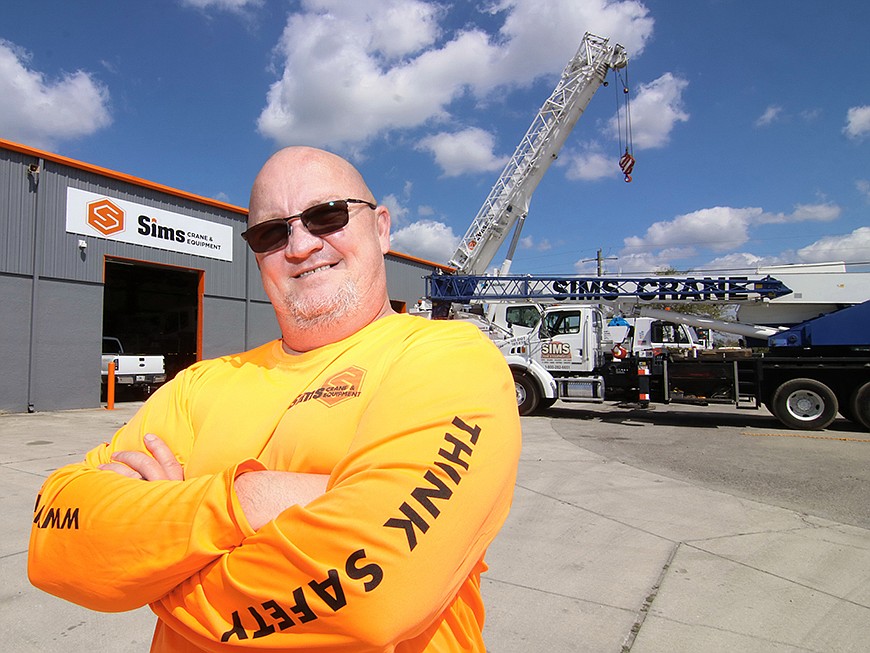The Fort Myers-Naples operation of Sims Crane and Equipment — Florida's largest crane company — had a lot of ground to gain back after the crippling construction slump that began in 2008.
A decade later, the unit has done that and more, outpacing 12 other Sims locations from Tampa to Tallahassee over to Jacksonville and down to Orlando and Miami. A third-generation family business founded in 1959 by Tampa ironworker Tommy Sims after a gruesome thumb injury forced him out of work, Sims Crane is based in Tampa.
As 2010 approached, Sims' 2-acre Lehigh Acres equipment yard had scant equipment. And it had only an occasional employee, tower crane operator Kenny Brass. Back then, Brass got dispatched out of Tampa or Miami for jobs that popped up in Fort Myers and Naples. Roughly 20 to 30 hours of work marked a good week.
By 2012, Brass was part of a crew of 11 workers. That crew has since grown to some 30 people. Under Brass' leadership, the team now works from a 5-plus acre yard in Fort Myers that Sims Crane moved to in October. The compound has 13 cranes with lifting capacities from 30 tons to 225 tons.
The Fort Myers unit hit record sales of $10 million last year, and Brass projects $11.5 million in 2018.
But the road back was a long one for Sims Crane's Fort Myers operation, says Dean Sims II, senior vice president of marketing, working out of the Tampa headquarters. “It was hit hardest by the recession,” he says.
No one among Sims Crane and Equipment's 500 Florida employees felt the hit harder than Brass, a 12-year Sims employee who moved from crane operator to sales in 2014. A Sarasota native and 48-year-old son of a bridge builder, Brass was named general manager last year.
Dean Sims partly attributes the new business at the Fort Myers-Naples location to two factors: the rebound from the recession and overall spending on infrastructure to support population growth.
Another contributing factor is a strategy to widen business lines after the recession. This included the addition of two similar but distinct services: Specialized hauling of heavy construction equipment and the rigging, or the lifting and securing, of large machinery, such as commercial air conditioners and MRI machines for transport. On-site consulting work and detailed 3-D project planning for clients completed the three-pronged growth plan.
“Fort Myers-Naples is a unique market for us,” says Dean Sims, “and the local operation has rebounded more than any other Sims Crane location.”
It also helps, say company officials, particularly in competing with larger, national rivals, that the company owns and operates all its equipment. “The cost of new cranes varies with global demand and runs from $250,000 up to about $10 million for the larger cranes in our fleet,” Sims says.
Brass says the new yard, at 1901 Benchmark Ave., is much better situated and will accommodate growth for years to come. “The new location is ideal because it is closer to the interstate, has plenty of room for our fleet of cranes and trucks and has 10,000 square feet of office and shop space,” he says.
One challenge is the crowded marketplace. Sims Crane Fort Myers has more than a dozen competitors in the region. That includes Hunter Crane Merchant Transport & Rigging, after its takeover of Allied Crane in Fort Myers. Sims also has strong competition in other Florida metro areas, a circumstance Dean Sims attributes to the overall strength of the construction sector.
Another obstacle to maintain the growth, similar to many companies in construction, is hiring and retaining top people. The company tries to grow its workforce from within, and has about 65 apprentices in training, Dean Sims says.
“The program takes four years,” says Sims, “so we are aiming to train operators today to fill the seat of machines we will buy four years into the future, which is a challenge.”






